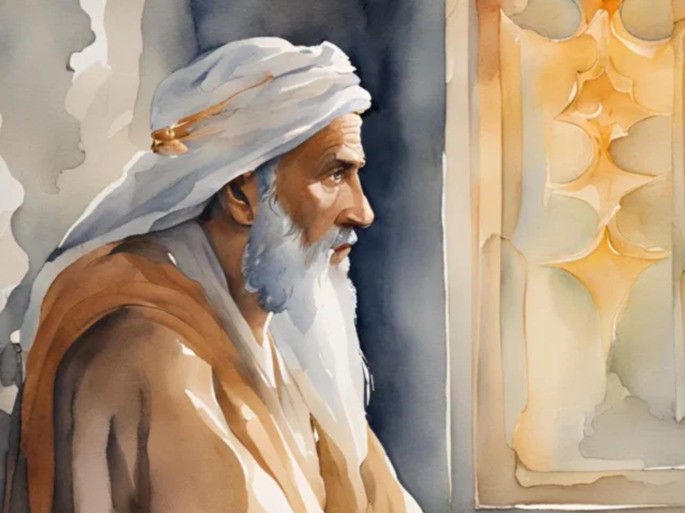Habakkuk was a prophet who lived in Judah before the Babylonian invasion, around 600 years before Jesus. In his book, he expresses his doubts and questions God about the violence and injustice he saw around him. God responds that He would use the Babylonians to punish the wicked, but that the righteous would live by faith. The story of Habakkuk teaches us to trust in God, even when we don’t understand His plans, and to hold on to faith during difficult times.
The prophet Habakkuk lived during a time of great moral, social, and religious corruption, during the reign of Jehoiakim, king of Judah. The people were involved in violence and injustice, and Habakkuk questioned God about this situation, asking why He allowed so much evil.
Habakkuk asked questions of God, expressing his doubts about the suffering of the righteous. God's answer was surprising: He said He would use the Babylonians, a people even more wicked to punish Judah. But God assured that the righteous would live by faith and that, in the end, He would bring justice.

Habakkuk is an example of faith and trust, even in the midst of suffering and hardship. He acknowledges that God is sovereign and just, even when we do not understand His plans. The legacy of Habakkuk teaches us the importance of trusting in God, believing that, despite adversity, He will always fulfill His purposes. The Bible does not tell us how Habakkuk died, and his story ends with a prayer of trust and praise to God.
Explanation of what the Book of Habakkuk teaches
The Book of Habakkuk is one of the prophetic books of the Old Testament and has three chapters. It features a dialogue between the prophet and God, where Habakkuk shares his doubts about the suffering and injustice he sees in the world.
The book is divided into three parts. First, the prophet questions God about the violence in Judah; then, God answers saying He will use the Babylonians to punish the people; finally, Habakkuk offers a prayer, thanking God for His justice and power.
At the beginning of the book, in Habakkuk 1:2–4, the prophet asks God why He allows evil and violence to dominate Judah, while the people live in injustice. Habakkuk is confused by his country’s condition and seeks answers about the suffering of the righteous.
God replies to Habakkuk, saying He is about to act and will raise up the Babylonians, a wicked nation, to punish Judah for its corruption. This answer surprises the prophet, who wonders how God could use such an evil people to discipline Judah (Habakkuk 1:5–11).
Habakkuk then asks a second question, expressing his shock that an even more wicked nation would be used to punish Judah. He questions God’s justice in allowing this (Habakkuk 1:12–17).
In Habakkuk 2:2–20, God responds again, affirming that although judgment is coming, justice will prevail. He assures that the righteous will live by faith, and that judgment against the Babylonians will also come in due time. God declares that the Babylonians and other wicked nations will face their own punishment.
At the end of the book, in chapter 3, Habakkuk responds with a prayer of praise and trust in God, acknowledging His sovereignty and power, despite the challenges. He expresses his faith that, even in times of crisis, God is faithful and will fulfill His purposes. The book ends on a note of hope and confidence in God.
How Habakkuk found faith amid corruption and violence
The life of the prophet Habakkuk teaches us a deep lesson about trusting in God, especially when facing difficulties and injustice.
Habakkuk lived during a time of great corruption and violence in Judah. He questioned God about the suffering of the righteous and the success of the wicked (Habakkuk 1:2–4). His doubts and anguish were understandable, but the book teaches us that even in uncertainty, we must trust in God.
God answers the prophet by revealing that He will use the Babylonians, a wicked people, to punish Judah. This brings even more distress to Habakkuk, who questions divine justice. However, God assures him that justice will come at the right time and that the righteous will live by faith (Habakkuk 2:4).
Despite suffering, Habakkuk learns that God’s sovereignty is unquestionable and that He always acts justly. In the end, Habakkuk responds with a prayer of trust (Habakkuk 3:17–19), showing that even in hard times, God is worthy of our praise.
What we can learn from Habakkuk’s story
Habakkuk’s story teaches us to trust in God even when we don’t understand His plans. The prophet questions suffering and injustice but learns that although God allows adversity, He is sovereign and just.
The central message is that, in times of crisis, we must live by faith, believing that God will fulfill His promises at the right time. The book also emphasizes the importance of prayer, honesty before God, and perseverance in faith, because even in pain, God is worthy of trust and praise.
Habakkuk expressed his doubts and anxieties but kept his faith in God’s sovereignty. His story teaches us to persevere, live by faith, and believe that God will bring justice in His time.
Learn more about the major and minor prophets in the Bible.
See also:
